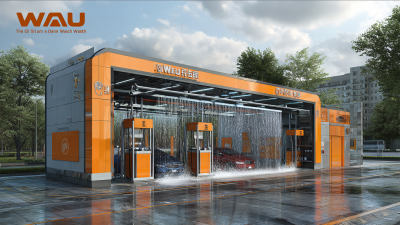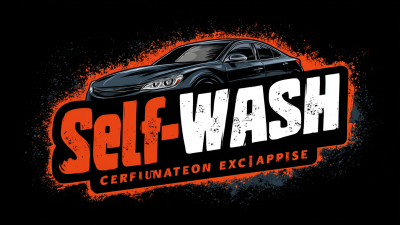The Future of Car Cleaning Discover How Automatic Carwash Equipment Is Revolutionizing Vehicle Care
As we navigate through the rapidly evolving landscape of vehicle maintenance, one of the most significant advancements is the emergence of Automatic Carwash Equipment. This innovative technology is not only redefining how we approach car cleaning, but is also setting new standards for efficiency and effectiveness in vehicle care. With the convenience of automated systems, car owners can achieve a sparkling clean vehicle with minimal effort, all while ensuring that environmental considerations are seamlessly integrated into the washing process.

The rise of Automatic Carwash Equipment reflects a broader trend towards digitization and smart technology in the automotive industry, promising a cleaner future that prioritizes both quality and convenience. As we explore the transformative effects of this technology, it becomes clear that the future of car cleaning is not just about appearances; it’s about creating a sustainable, user-friendly experience that meets the needs of modern drivers.
The Evolution of Automatic Carwash Technology: A Brief Overview
The automatic car wash industry has undergone significant transformations over the past few decades, thanks to advances in technology and consumer preferences for convenience and efficiency. According to a report by IBISWorld, the car wash industry in the United States generates over $11 billion in revenue annually, with automatic car washes accounting for a substantial portion of that revenue. This shift towards automation has not only enhanced service speed but also improved the quality of vehicle cleaning.
The evolution of automatic carwash technology began with basic systems that relied on manual controls and limited cleaning capabilities. Today, cutting-edge machinery such as touchless systems and soft-touch brushes utilize advanced sensors and high-pressure water jets to deliver an unparalleled car cleaning experience. A study by Grand View Research predicts that the global automatic car wash market will continue to expand, projected to grow at a CAGR of 4.6% from 2021 to 2028, driven by increasing vehicle ownership and a growing emphasis on environmental sustainability. These innovations are not just enhancing the cleaning process but also promoting water conservation and efficiency in operations, making automatic car washes a preferable choice for eco-conscious consumers.
Key Benefits of Automatic Carwash Equipment for Vehicle Owners
The evolution of automatic carwash equipment is transforming the landscape of vehicle care for car owners across the globe. With the market size projected to reach $1.14 billion by 2033, the growth indicates a strong shift towards convenience and efficiency in car cleaning. Automatic car washes not only save time for consumers, but also enhance the cleaning process with advanced technology that ensures a thorough wash without the risk of scratches or damage.
**Tips for Choosing an Automatic Car Wash:**
1. Look for facilities that offer touchless wash options to minimize any potential for scratches.
2. Consider the frequency of your car washes; many places offer subscriptions for regular cleanings at discounted rates.
The new "wash-to-attract" model being adopted by gas stations illustrates how automatic carwash services are being integrated into everyday conveniences, allowing owners to clean their vehicles while refueling. This synergy not only drives ancillary revenue but also enhances the customer experience, making vehicle maintenance easier than ever before. Expect to see continued innovation in this field, making automatic car washes a staple in vehicle care routines.
The Future of Car Cleaning: Key Benefits of Automatic Carwash Equipment for Vehicle Owners
How to Choose the Right Automatic Carwash System for Your Vehicle
When selecting the ideal
automatic carwash system
for your vehicle, it's crucial to consider several key factors. Firstly, assess the cleaning needs based on your vehicle's size and the types of dirt it typically accumulates. According to the International Carwash Association, the demand for
touchless car washes
has surged, reaching a
30% market share
in the last decade. These systems use high-pressure water and specialized cleaning agents, making them perfect for vehicles that are prone to scratches, such as luxury cars.
Another important aspect is the
technology
incorporated into the carwash system. Advanced features like foam cannons, undercarriage cleaning, and drying technology can significantly enhance the car cleaning experience. A recent report from
MarketsandMarkets
indicates that the global automatic car wash market is projected to grow from
$5.4 billion in 2020
to
$8.4 billion by 2025, driven by innovation and consumer preference for convenience. Opting for a system with
state-of-the-art technology
can save time and ensure a meticulous clean, resulting in better vehicle maintenance and longevity.
Innovative Features in Modern Carwash Solutions: What to Look For
The automotive cleaning industry is undergoing a significant transformation, thanks in part to advanced automatic carwash equipment. Modern carwash solutions now feature innovative technologies that promise not only superior cleaning but also efficiency and sustainability. According to a report by IBISWorld, the automatic carwash industry is projected to grow at an annual rate of 3.7% over the next five years, driven by the increasing demand for quick and convenient vehicle care.
One standout feature of contemporary carwash systems is the integration of smart technology. These systems often include touchless wash technology that minimizes the risk of scratches while providing a thorough clean. Additionally, automated wash cycles equipped with advanced sensors can adapt to various vehicle types and soil levels, ensuring optimal results without wasting water or chemicals. As per a report from Grand View Research, the global market for carwash systems is expected to reach $40 billion by 2025, showcasing the industry's commitment to innovation and quality.
Moreover, sustainability has become a crucial consideration in modern carwash solutions. Many facilities are now implementing water recycling systems that can reuse up to 80% of the water used in the wash process, contributing to resource conservation. Alongside eco-friendly cleaning products, these innovations reflect a growing trend towards environmentally responsible vehicle care. Industry data indicates that consumers are increasingly prioritizing green options, with 70% of surveyed drivers willing to pay more for eco-friendly services, making it essential for carwash operators to keep pace with these expectations.
The Future of Car Cleaning: Discover How Automatic Carwash Equipment Is Revolutionizing Vehicle Care
| Feature | Description | Benefits |
|---|---|---|
| Touchless Technology | Utilizes high-pressure water jets and specialized detergents to clean vehicles without physical contact. | Reduces the risk of scratches and damage, and is suitable for all types of vehicles. |
| Smart Technology Integration | Incorporates sensors and data analytics for personalized wash programs based on vehicle type and condition. | Enhances efficiency and provides a tailored cleaning experience, increasing customer satisfaction. |
| Eco-Friendly Solutions | Uses biodegradable detergents and recycles water to minimize environmental impact. | Promotes sustainability and attracts environmentally conscious customers. |
| Mobile Payment Systems | Enables contactless payments through phone apps or QR codes for convenience. | Streamlines the payment process and enhances user experience. |
| Automated Booking Systems | Allows users to schedule car washes via websites or mobile apps. | Improves customer convenience and helps manage car wash schedules efficiently. |
The Environmental Impact of Automated Car Cleaning Systems
The rise of automated car cleaning systems has significant implications for environmental sustainability. Traditional car wash methods often consume large quantities of water and involve harmful chemicals that can pollute local water bodies. In contrast, touchless car wash systems significantly reduce water usage while providing high-quality cleaning results. For instance, the global market for touchless car wash systems is projected to reach approximately $1.03784 billion by 2025, with an expected compound annual growth rate of 1.0% until 2033. This shift towards more efficient cleaning methods not only reflects growing consumer preferences but also highlights the industry's commitment to reducing environmental footprints.
Moreover, automated car cleaning solutions are integrating advanced technologies, such as laser cleaning equipment, which offers precise and eco-friendly options for vehicle care. The laser cleaning market, including types like solid state and fiber lasers, is expected to expand significantly as businesses seek less water-intensive and chemical-free alternatives. The market value of tank cleaning services is projected to grow from $57.716 million in 2024 to $731.13 million by 2032, indicating a broader trend where industries adopt innovation to achieve cleaner processes and mitigate pollution associated with vehicle maintenance.
Related Posts
-

Ultimate Guide to Choosing the Best Automatic Car Wash Equipment for Your Business
-

Unmatched Quality: China’s Top Drive Through Car Wash Machines for Global Buyers
-

5 Essential Tips to Optimize Your Machine Car Wash Business for Global Buyers
-

Navigating Industry Standards and Challenges in the Best Car Wash Machine Production
-

How to Navigate Import and Export Certifications for the Best Self Wash Car Wash Equipment
-

How to Select the Best Self Car Wash Machine: Essential Tips for Global Buyers